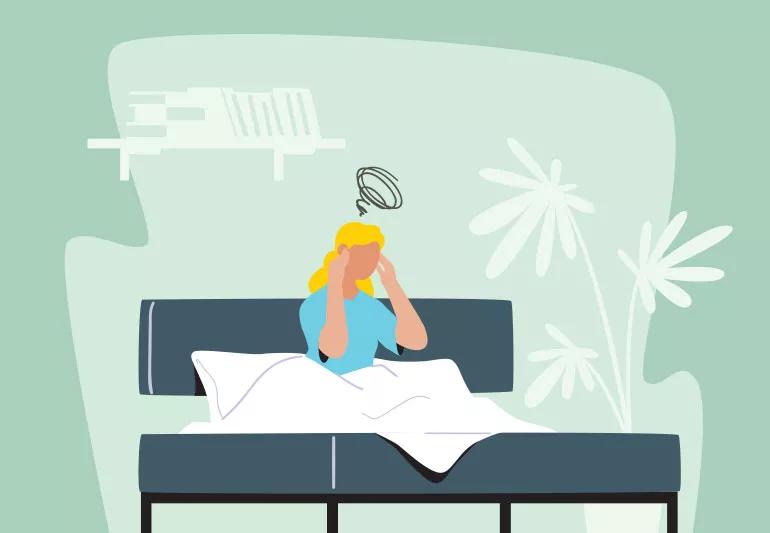Understanding when it may (and may not) be the culprit

Image content: This image is available to view online.
View image online (https://assets.clevelandclinic.org/transform/d7398f59-78ca-4f8c-9a94-0d1d9cd425d1/BPheadaches-1308350767-770x553-1_jpg)
woman in bed with headached
One minute, you’re going about your day feeling fine. The next minute, your head feels like it’s weighed down by a bag of rocks. Headaches are common, but they can often start to disrupt your day-to-day life.
Advertisement
Cleveland Clinic is a non-profit academic medical center. Advertising on our site helps support our mission. We do not endorse non-Cleveland Clinic products or services. Policy
So the million-dollar question is: Why do I keep getting headaches?
A wide range of lifestyle and environmental factors can cause headaches. (It could be that salami sandwich you had for lunch or the looming thunderstorm.) But if you have high blood pressure (or hypertension), you might wonder if there could be a link.
The short answer, says cardiologist Luke Laffin, MD, is not usually. Dr. Laffin explains what you need to know if you have both high blood pressure and headaches.
The truth is, Dr. Laffin says, slightly elevated blood pressure doesn’t cause headaches in most people.
While your blood pressure is a good measure of your health and your risk for certain conditions, having mild (stage 1) or moderate (stage 2) hypertension isn’t likely to cause headaches.
“The vast majority of people have no symptoms whatsoever from high blood pressure,” says Dr. Laffin. But he notes that it’s likely that if your blood pressure spikes to an unusually high level, you may have symptoms including a headache.
“If you have a sudden, intense headache that’s significantly worse than usual and your blood pressure is elevated, you should seek medical attention,” stresses Dr. Laffin.
It’s important to pay close attention to any spikes in your blood pressure because it could be a sign of a bigger issue, like a stroke. So, be sure to listen to your body’s warning signs and contact your healthcare provider if your blood pressure has spiked significantly and isn’t coming down.
Advertisement
There’s no high-quality research showing that a headache from a spike in blood pressure feels any different from a regular headache, Dr. Laffin notes.
He also points out that it can sometimes be tricky to tell what’s causing what.
“Another thing to remember about headaches and blood pressure is that it’s not always the blood pressure that causes a headache,” says Dr. Laffin. “It could be the other way around. Sometimes, it’s a chicken and the egg scenario. We don’t know which comes first. Headaches can cause an elevation in blood pressure.”
Depending on how the spike in blood pressure is affecting your body, you might also have other symptoms along with a headache, including:
“If you notice a spike in blood pressure, that elevated number in itself doesn’t mean you need to go to a hospital,” Dr. Laffin says. “But if it’s coupled with something new, like a severe headache, severe chest pain or shortness of breath, then you should go get evaluated.”
If you have high blood pressure, you need to be mindful about which treatments you choose, especially if you’re taking high blood pressure medications.
Diet plays a role in headaches for about 1 in 5 people. But the list of potential culprits — from artificial sweeteners to pickles to red wine — is long. It’s best to keep a food diary to find out if any foods are a headache trigger.
If your headache is becoming unbearable, your first instinct might be to reach for some type of pain reliever. Just know that if you’re taking high blood pressure medications, aspirin or acetaminophen are your best options, Dr. Laffin says. Talk to your doctor about other over-the-counter or prescription options to make sure they’re safe for you.
To hear more from Dr. Laffin on this topic, listen to the Health Essentials Podcast episode, “Combating High Blood Pressure.” New episodes of the Health Essentials Podcast publish every Wednesday.
Advertisement

Sign up for our Health Essentials emails for expert guidance on nutrition, fitness, sleep, skin care and more.
Learn more about our editorial process.
Advertisement
Exercising, hydrating and other natural remedies can help a headache without the meds
Certain components found in wine like tannins and histamines may be the culprit
TMJ pain can cause headaches, but chiropractic treatments, lifestyle adjustments and medication can help ease discomfort
Dehydration, spinal fluid leaks and other conditions can cause positional headaches when you stand up
It’s all about the amount — try to stick to 100 to 150 milligrams a day to reduce and prevent a pounding, throbbing head
Many factors, like dehydration, a cold or even your medication, can result in these common symptoms
Behind your eye, on one side of your face or as a band around your head — headaches are no fun
Yes, especially if you get migraines — but medicine can help
Although it could be used as a moisturizer, this new trend is not recommended
Communicating clear limits helps protect your time, energy and emotional well-being
High cholesterol can be genetic, but testing and treatment can lower your heart disease risk